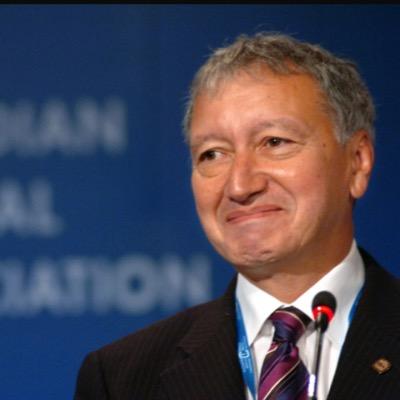
Dr. Brian Day
@DrBrianDay 
- Past President Canadian Medical Association
- Past President Arthroscopy Association of North America
- Honourary Associate Professor University of British Columbia
- 2014 Doctors of BC Don Rix Leadership Award


Politicians fail to address health issues, Day charges
Aaron Derfel
MONTREAL -- The outgoing president of the Canadian Medical Association blasted political parties at the federal level Tuesday for failing to address the country's pressing health care problems.
In a final address, Vancouver surgeon Brian Day bemoaned the fact that more than one million Canadians are on waiting lists for health care and that five million people don't have access to a family doctor. Yet neither the governing Conservatives nor the Liberal opposition seems to care, he charged.
"Individually, most [politicians] have a deep understanding of the plight of our health care system," Day told delegates at the CMA's annual meeting in Montreal. "Collectively, especially at the federal level, they are reluctant -- even afraid -- of engaging in a meaningful public policy discussion on health. For example, in last October's throne speech I listened as the topic of health care was almost completely ignored by our Conservative government.
"Not to be outdone, the Liberal Party of Canada recently sent out a questionnaire based on what they identified as today's issues of crucial significance," he added. "Of 16 questions in their poll not one question related to health care."
Day, an orthopedic surgeon who runs a private surgical clinic in Vancouver, has been labelled by critics as "Dr. Profit" and "Darth Vader" for his advocacy of the private sector playing a greater role in the delivery of health care.
Tuesday, he poked fun at himself in a video shown to delegates in which he dressed up in the black costume of the Star Wars villain.
He continued joking with reporters during a news conference afterward.
"For those of you who followed those movies like I did, [Darth Vader] was actually a good guy because when it came to the point when he was actually going to kill Luke Skywalker, he gave in and actually went from the dark side to the good side," he said, chuckling.
In his speech, Day reiterated that Canada's public system must change and should embrace some private-sector initiatives. To that end, he suggested that public-private partnerships be set up to fund the education of medical students.
"Despite the best efforts of medical schools to expand, we have actually dropped further in the OECD rankings this year," he said, referring to the Organization for Economic Cooperation and Development.
Day said Canada now ranks 26th out of 28 countries in doctors per population. Adding to the pressure, he said, is the fact that 4,000 doctors are about to retire.
A resolution to develop a strategy for public-private partnerships in publicly funded health services was approved.
Day also called for the Canada Health Act of 1984 to be updated, noting that in its current form, the act impedes progress and change.
Day said the CMA will make health care an issue during an expected fall election campaign, although it won't lobby against or support any one party.
He called for patients to be the focus of the health care system, for more spaces in Canadian universities to train doctors and for action to address wait times for health care.
"In Canada we pay dearly to keep patients on waiting lists. This is illogical. Preventing patients from getting treatment is not my definition of preventive medicine," he said, adding that the cost to the economy in 2007 was $14.8 billion.
"This excluded the growing costs of waiting to see a GP or specialist. And it excluded the costs as patients deteriorate and develop chronic, severe irreversible damage, addiction to painkillers, or depression."
Earlier in the day, Claude Castonguay, a former health minister in Quebec, addressed the conference. He summarized the findings of a report he submitted to the provincial government in February in which he called for, among other things, user fees for certain medical services.
He said the public health care system, as it now stands, is not financially sustainable.
Incoming CMA president Robert Ouellet, a Quebec radiologist, will address the conference today